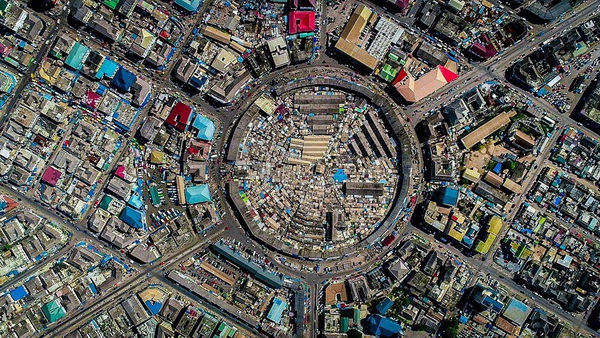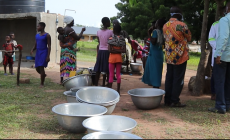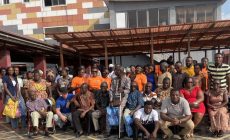Kiosks, containers take over walkways in Sekondi-Takoradi
- Posted on
- Comment

The increasing population and unguided commercial activities in the twin city of Sekondi-Takoradi have turned the well-planned and third largest city in the country into a town of kiosks.
The commercial activities of road side-mechanics, food vendors, mobile money vendors, barbering shops and petty traders, which generate tonnes of waste, are seriously fading away the beauty and clean city environment.
While designing the layout of Sekondi-Takoradi, the city planners created boulevards with footpaths for pedestrians to keep them off the street; however, the situation has changed.
The streets of the twin city and the adjoining Effia-Kwesimintsim Municipality are a perfect demonstration of lawlessness involving traders and the general public. The shoulders of the streets have been turned into kiosk avenues for barbering, hairdressing and petty trading shops.
Adding to that is the fact that the kiosks of all shapes and sizes do not have places of convenience.
Occupants of these containers urinate, defecate and put other forms of waste into small plastic containers and dispose of them in gutters in front of their respective containers.
The anomalies
While many of the kiosks and containers are sited on water hydrants, others sandwich electricity poles and hinder access to some strategic national assets.
The Daily Graphic set out to find out how these containers found their way on to the streets and it was discovered that assembly members who have arrogated powers to themselves allocated these strategic buffers to traders.
As a result, the managers of the Sekondi-Takoradi Metropolis and Effia-Kwesimintsim Municipal Assembly have grown a monster that is consuming the city, increasing waste and operating without control.
Aside from the kiosks, the streets of the Sekondi-Takoradi Metropolis and Effia-Kwesimintsim are inundated with thousands of food vendors, who operate in the morning and evening.
These food vendors use the open gutters for the disposal of their food waste, wastewater and other forms of waste generated through their daily activities.
Mechanics
Another ugly phenomenon that managers of the cities are failing to address is the reckless opening of garages or what is popularly known as mechanic shops in the city.
Many years ago, the metropolitan assembly in its move to clear mechanics located at West Tanokrom, allocated a parcel of land at Mampong for their relocation, which is a distance from the central business district.
However, years after the relocation of these mechanics, the Mampong site is empty and many of these mechanics have integrated into various parts of the city operating next to residential facilities and on streets.
Several calls to the assemblies, road safety and other regulators have yielded nothing. The situation is such that these mechanics park vehicles undergoing repairs on both sides of streets.
Commercial drivers
Aside from the unauthorised mechanic shops in communities, other unacceptable practices are the activities of drivers who have turned communities into bus and taxi terminals.
Bus stops at Effia-Kuma Number 9 Traffic Light, Pipeano, Jubilee Park and many parts of the central business district have been converted to loading bays by the taxi and tro-tro drivers.
The unhealthy situation created by these drivers who have no affiliation to any of the transport unions has also festered beyond redemption by the Motor Traffic and Transport Directorate (MTTD) of the Ghana Police Service.
The drivers continue to use these places for loading, endangering the lives of members of the public and other road users with impunity.
Members of the general public have expressed surprise that managers of the city look on unconcerned while the drivers have a field day.
A resident of Anaji, a suburb in the metropolis, Mr Alfred Kojo Nsiah, said it was sad that all street corners had been converted into markets, bus terminals, footpaths turned into shops and pedestrians, especially children had to dangerously share the street with cars.
He expressed shock that even some properties had been developed to cover these footpaths and nobody seemed to care.
City authority
The Public Relations Officer of the Sekondi-Takoradi Metropolitan Assembly, Mr John Laste, said the increasing numbers of metal kiosks and trading activities along the street was a source of worry to the assembly.
“In our quest to curb the situation, we came up with the standardised kiosk, which would have the same features and not what we have currently – our infrastructure development proposal team came up with the drawings but the challenge is funding,” he stated.
He said what the assembly was thinking of doing was allowing hawking on the boulevards where traders use foldaway stands as pertained in other countries.
“With that, those selling waakye, kenkey, porridge and tea, among others, could easily trade and clear the stands and allow free flow of human traffic, but the current situation with all the challenges is not acceptable,” he said.
Mr Laste said the current situation required a conscious effort and the support from members of the general public to make the city work.
“A city with proper waste management system, a city where all walkways are free of trading activities is what we hope to achieve with the support of all stakeholders,” he said.
-Graphic










 (Selorm) |
(Selorm) |  (Nana Kwesi)
(Nana Kwesi)